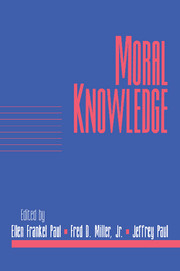Book contents
- Frontmatter
- Contents
- Introduction
- Acknowledgments
- Contributors
- Realist-Expressivism: A Neglected Option for Moral Realism
- Thinking about Cases
- But I Could Be Wrong
- Moral Facts and Best Explanations
- Two Sources of Morality
- “Because I Want It”
- Realism, Naturalism, and Moral Semantics
- Incomplete Routes to Moral Objectivity: Four Variants of Naturalism
- Explanation, Internalism, and Reasons for Action
- Moral Knowledge as Practical Knowledge
- Practical Reason and Moral Psychology in Aristotle and Kant
- Hypothetical Consent in Kantian Constructivism
- Mill's “Proof” of the Principle of Utility: A More than Half-Hearted Defense
- Index
Thinking about Cases
Published online by Cambridge University Press: 04 August 2010
- Frontmatter
- Contents
- Introduction
- Acknowledgments
- Contributors
- Realist-Expressivism: A Neglected Option for Moral Realism
- Thinking about Cases
- But I Could Be Wrong
- Moral Facts and Best Explanations
- Two Sources of Morality
- “Because I Want It”
- Realism, Naturalism, and Moral Semantics
- Incomplete Routes to Moral Objectivity: Four Variants of Naturalism
- Explanation, Internalism, and Reasons for Action
- Moral Knowledge as Practical Knowledge
- Practical Reason and Moral Psychology in Aristotle and Kant
- Hypothetical Consent in Kantian Constructivism
- Mill's “Proof” of the Principle of Utility: A More than Half-Hearted Defense
- Index
Summary
THE PRIORITY OF CASE SPECIFIC INTUITIONS
Anyone who reflects on the way we go about arguing for or against moral claims is likely to be struck by the central importance we give to thinking about cases. Intuitive reactions to cases—real or imagined—are carefully noted, and then appealed to as providing reason to accept (or reject) various claims. When trying on a general moral theory for size, for example, we typically get a feel for its overall plausibility by considering its implications in a range of cases. Similarly, when we try to refine the statement of a principle meant to cover a fairly specific part of morality, we guide ourselves by testing the various possible revisions against a carefully constructed set of cases (often differing only in rather subtle ways). And when arguing against a claim, we take ourselves to have shown something significant if we can find an intuitively compelling counterexample, and such counterexamples almost always take the form of a description of one or another case where the implications of the claim in question seem implausible. Even when we find ourselves faced with a case where we have no immediate and clear reaction, or where we have such a reaction, but others don't share it and we need to persuade them, in what is probably the most common way of trying to make progress we consider various analogies and disanalogies; that is to say, we appeal to still other cases, and by seeing what we want to say there, we discover (or confirm) what it is plausible to say in the original case.
- Type
- Chapter
- Information
- Moral Knowledge , pp. 44 - 63Publisher: Cambridge University PressPrint publication year: 2001
- 5
- Cited by

